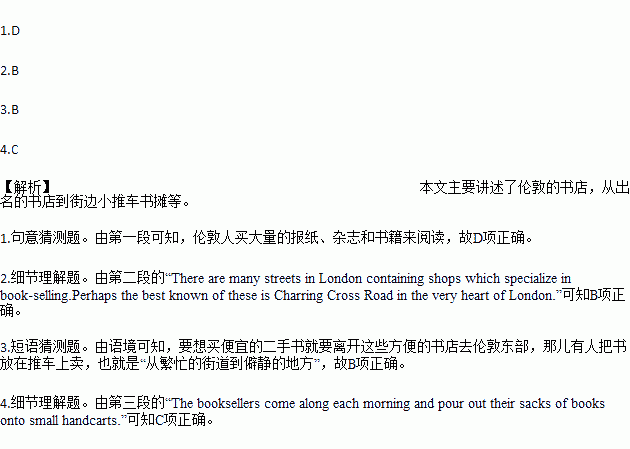题目内容
Londoners are great readers.They buy vast numbers of newspapers and magazines and of books-especially paperbacks,which are still comparatively cheap in spite of ever?increasing rises in the costs of printing.They still continue to buy “proper”books,too,printed on good paper and bound(装订)between hard covers.
There are many streets in London containing shops which specialize in book?selling.Perhaps the best known of these is Charring Cross Road in the very heart of London.Here bookshops of all sorts and sizes are to be found,from the celebrated one which boasts of being “the biggest bookshop in the world”to the tiny,dusty little places which seem to have been left over from Dickens' time.Some of these shops stock,or will obtain,any kind of books,but many of them specialize in second?hand books,in art books,in foreign books,in books on philosophy,politics or any other of the countless subjects about which books may be written.One shop in this area specializes only in books about ballet!
Although it may be the most convenient place for Londoners to buy books,Charring Cross Road is not the cheapest.For the really cheap second?hand books,the collector must venture off the beaten track,to Farringdon Road,for example,in the East Central district of London.Here there is nothing so impressive as bookshops.The booksellers come along each morning and pour out their sacks of books onto small handcarts.And the collectors,some professionals and some amateurs,have been waiting for them.In places like this they can still,occasionally,pick up for a few pence an old one that may be worth many pounds.
1.“Londoners are great readers.”means that .
A. Londoners are great because they read a lot
B. there are a great number of readers in London
C. Londoners are readers who read only great books
D. Londoners read a lot
2.According to this passage,Charring Cross Road .
A. is in the suburbs of London
B. is famous for its bookshops
C. contains various kinds of shops
D. is the busiest street in London
3.In this passage,what does the underlined part “venture off the beaten track”mean?
A. Buy books in a most busy street.
B. Move away from a busy street.
C. Waste time looking for books.
D. Take a risk of losing one's life.
4.On Farringdon Road, .
A. you can find fine bookshops for the latest books
B. there are only small bookshops for the secondhand books
C. you can see booksellers selling books on handcarts
D. the same books as the ones in the bookshops of Charring Cross Road are sold


 ),并在其下面写出该加的词。
),并在其下面写出该加的词。